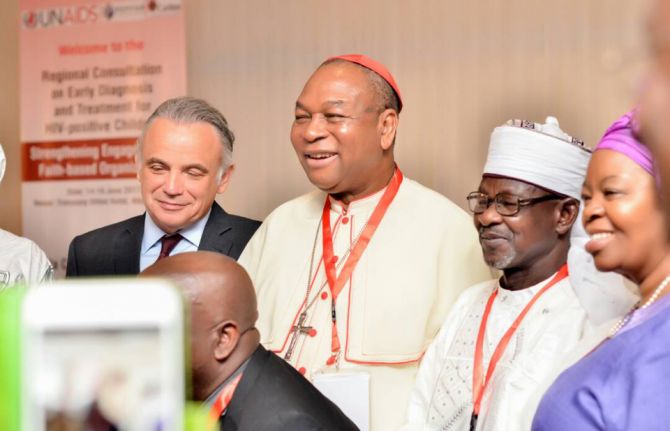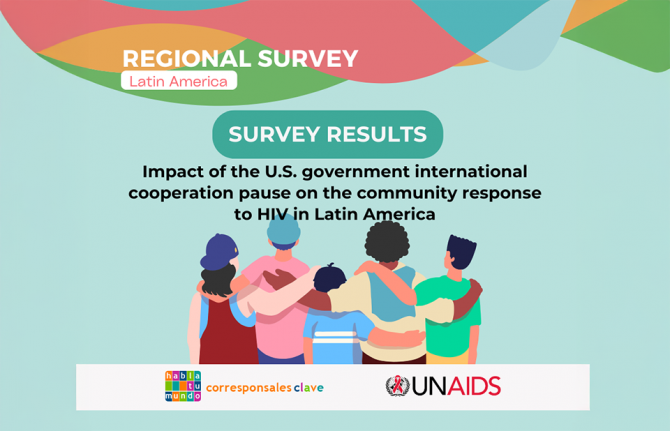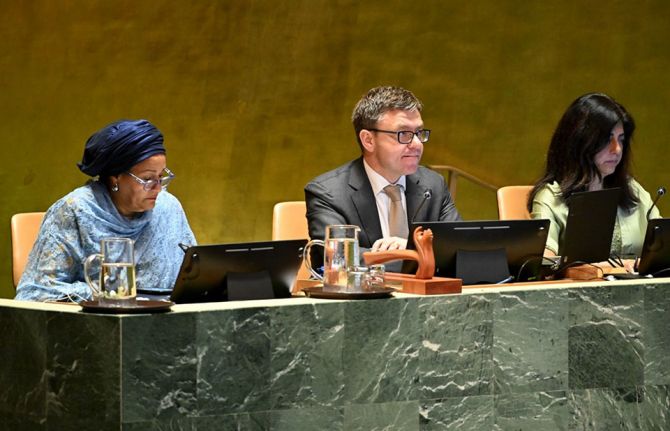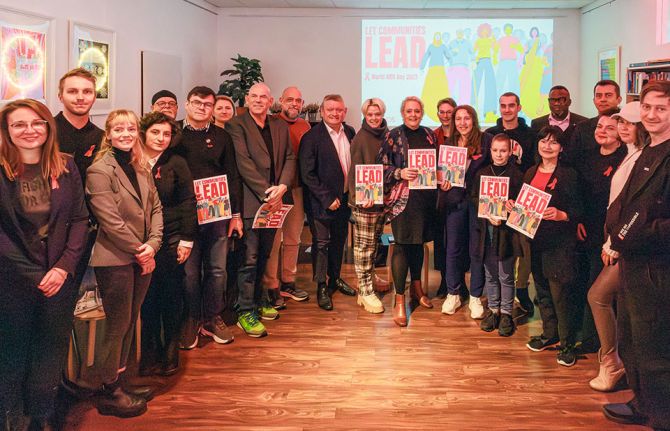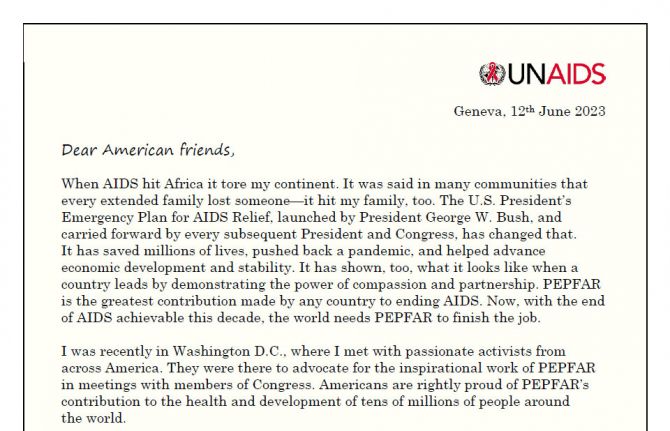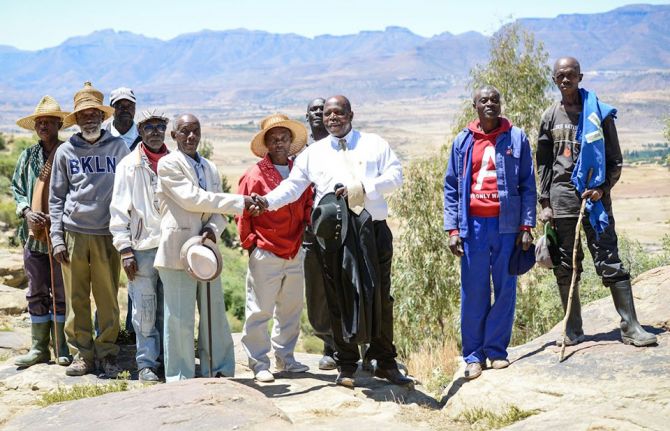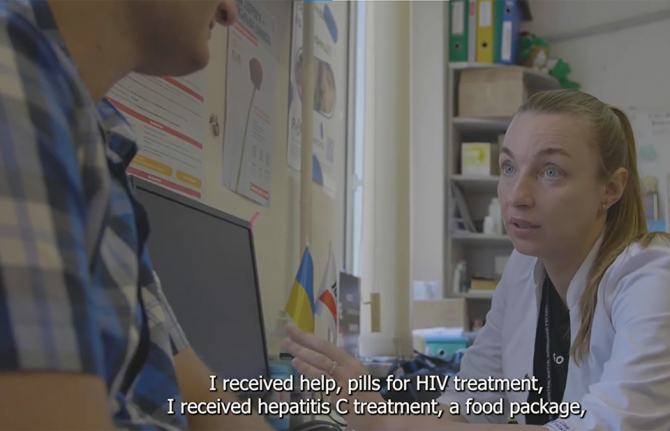
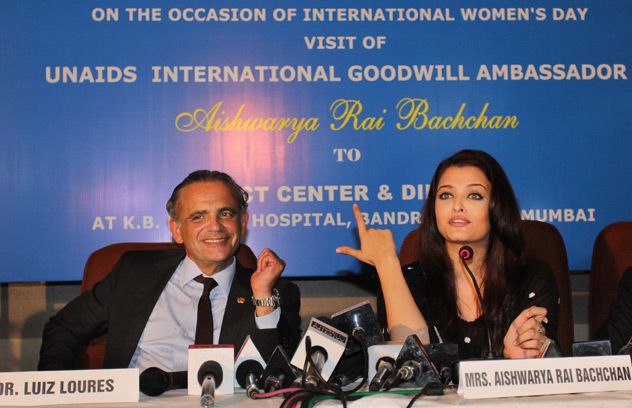
UNAIDS Deputy Executive Director Luiz Loures and UNAIDS International Goodwill Ambassador and actress Aishwarya Rai Bachchan.
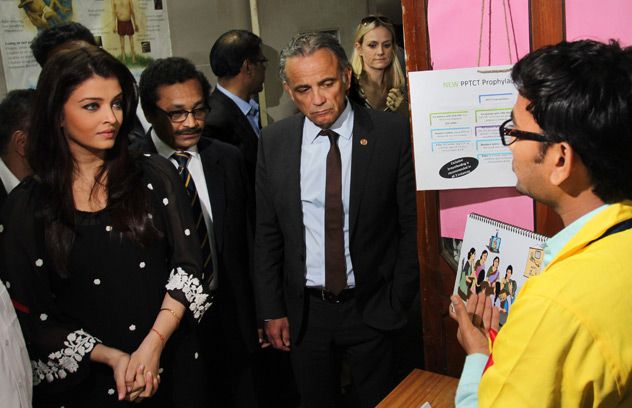
UNAIDS International Goodwill Ambassador and actress Aishwarya Rai Bachchan, Secretary of Health Dr VK Subburaj and UNAIDS Deputy Executive Director Luiz Loures visiting the Bandra Bhabha Hospital.
Update
A call to action against gender-based violence
10 March 2014
10 March 2014 10 March 2014UNAIDS International Goodwill Ambassador and actress Aishwarya Rai Bachchan recently joined UNAIDS Deputy Executive Director Dr Luiz Loures and the Indian Secretary of the Department of AIDS Control Dr VK Subburaj on a mission in Mumbai to highlight the impact of gender-based violence and the need to continue scaling up efforts to stop new HIV infections among children.
Held on International Women’s Day—8 March—the mission was an opportunity for Mrs Rai Bachchan to raise awareness around issues of gender-based violence and advocate for more work to be done in India to promote gender equality, the empowerment of women and provide support to people affected by gender-based violence. The delegation visited the Dilaasa project, the first public hospital-based crisis centre in India designed to respond to the needs of women facing sexual violence and violence within their homes and families.
Globally women are 55% more likely to be HIV-positive if they have experienced intimate partner violence. A study among married women in India established that physical and sexual violence by husbands was associated with a nearly four-fold increase in the prevalence of HIV infection.
During the visit to the Dilaasa clinic the group met with staff as well as some of the women personally affected by gender-based violence. They heard about the importance of the critical support offered by the crisis centre as well as the empowerment the centre provided by allowing access to services that had not been previously available.
As part of the mission Mrs Rai Bachchan was also able to take stock about progress made on stopping new HIV infections among children in India, an issue close to her heart. She visited the Bandra Bhabha Hospital, India’s first integrated health centre where women can access a broad range of services including treatment to prevent new HIV infections among children and HIV counselling as well as access to care and support for gender-based violence. She talked with the women and mothers using the centre and heard how the centre had given them renewed hope.
India is one of the 22 countries which account for 90% of new HIV infections among children. In 2011 UNAIDS and partners launched a Global Plan towards the elimination of new HIV infections among children by 2015 and keeping their mothers alive to increase efforts among the countries most affected. As UNAIDS International Goodwill Ambassador, one of Mrs Rai Bachchan’s main roles is to raise awareness to stop new HIV infections among children and advocate for efforts to be stepped up to keep children free from HIV and their mothers alive.
Quotes
"A people’s movement for protecting women and girls against violence including sexual abuse, led by women, is emerging in India and around the world and we must all be a part of it and strengthen it… All women, whether rich or poor, from developing countries or developed countries, sex workers or a housewives, need a safe environment where they lead equal lives, and able to make choices about their sexual and reproductive health without coercion or fear of violence."
"I am deeply moved by what I saw here today and I applaud the hospital staff for their excellence. I also believe every girl has the right to grow up in a world, where she is not discriminated against because of her gender. Girls and women must be encouraged to recognize that equal opportunities exist in society today and they must be encouraged and supported to make productive and informed choices. We don't need words of reassurance— WE NEED ACTION!!"

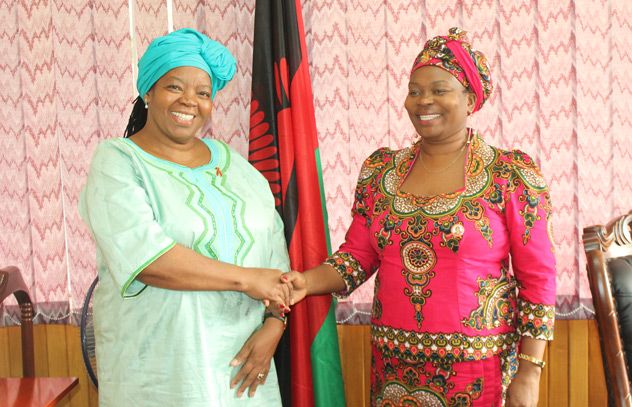
Sheila Tlou, Director, UNAIDS Regional Support Team for Eastern and Southern Africa (left) with Catherine Gotani-Hara, Malawi Minister of Health.
Update
Malawi government commits to scale up HIV prevention programmes to reduce new HIV infections
05 March 2014
05 March 2014 05 March 2014The government of Malawi, in collaboration with its partners, is revitalizing its national prevention strategy to scale up HIV prevention programmes, particularly for people most affected by the epidemic.
In the last decade, Malawi has become a global leader in preventing new HIV infections among children, in part thanks to the establishment of its treatment programme for pregnant women living with HIV. In 2012, new HIV infections among children had declined to 11 000 compared to the 28 000 in 2001. Estimated AIDS-related deaths also decreased from 86 000 in 2001 to 46 000 in 2012.
However, despite the progress made—there were 40% fewer new HIV infections in the country in 2012 compared to more than a decade ago—around 180 new HIV infections are still occurring every day in Malawi.
To reduce the number of new infections, the Government has developed a road map to improve the national HIV prevention strategy. The plan include key mile stones such as undertaking an analysis of the existing programmatic and financial gaps on HIV prevention; collecting community perspectives through community dialogues with couples, young women and girls and sex workers; and creating a Think tank to reach consensus on the innovative strategic directions to apply on HIV prevention.
During her visit to the country on 25 February, Sheila Tlou, Director of UNAIDS Regional Support Team for Eastern and Southern Africa stressed the importance to revitalise the national AIDS plan to reach vulnerable populations with proven and sustainable HIV prevention programmes, including voluntary male circumcision.
Quotes
“We acknowledge the challenges we have when it comes to new infections but Malawi is committed to build on its results and not regress on its gains.”
“Malawi needs to turn off the tab on new HIV infections. We have to protect women and girls from getting infected with HIV by keeping girls in school, increasing the legal marriage age, and ending violence against women and girls.”
Related

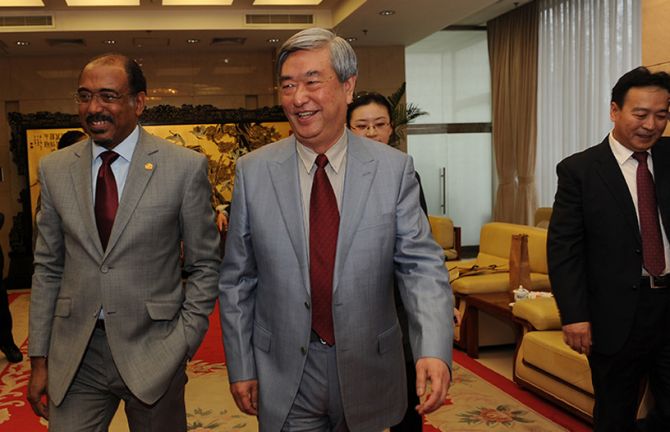
UNAIDS Executive Director, Michel Sidibé and President of Xinhua News Agency Li Congjun signed an extension to the Xinhua-UNAIDS Memorandum of Understanding.
Credit: UNAIDS/ Z. Lilong
Update
UNAIDS and Xinhua make new agreement for increased partnership on HIV
28 February 2014
28 February 2014 28 February 2014The Chinese news agency, Xinhua and UNAIDS have renewed their partnership for joint efforts on HIV through a two-year extension of the Memorandum of Understanding. The agreement was signed during a meeting between UNAIDS Executive Director, Michel Sidibé and Xinhua’s President Li Congjun at the news agency’s headquarters in Beijing, China on Thursday 28 February.
Xinhua’s President Li reiterated the importance of responding to the AIDS epidemic and Xinhua’s commitment to raising public awareness. He assured Xinhua’s widespread support of the #ZeroDiscrimination campaign and his commitment to the expansion of the Xinhua-UNAIDS collaboration towards impact and results.
Mr Sidibé thanked Mr Li and Xinhua for the important support of the new agency and urged that the successful collaboration with Xinhua be documented and shared as an example of solid media partnership on HIV.
The Xinhua-UNAIDS Memorandum of Understanding was first signed in September 2011 where they agreed to leverage each organization’s skills to reach universal access goals towards HIV prevention, treatment, care and support. Efforts carried out during the past years include a global media campaign to promote public awareness of HIV and support for World AIDS Day activities such as the showcasing of the World AIDS Day theme of “Getting to Zero” on a giant electronic screen in Times Square, New York in 2011.
Quotes
"I truly admire the work UNAIDS has done over so many years in the response to HIV and the achievements UNAIDS has made. As we sign this MoU today, it will be a new starting point for our future cooperation. I want to expand our cooperation and to do things which achieve even greater impact around the world."
"Xinhua’s partnership has helped greatly to put the vision of three zeros—zero discrimination, zero new infections, zero deaths— out to the world. I’m delighted with the extension of our partnership. This is helping to keep HIV at the forefront of people’s minds and actions."
Related

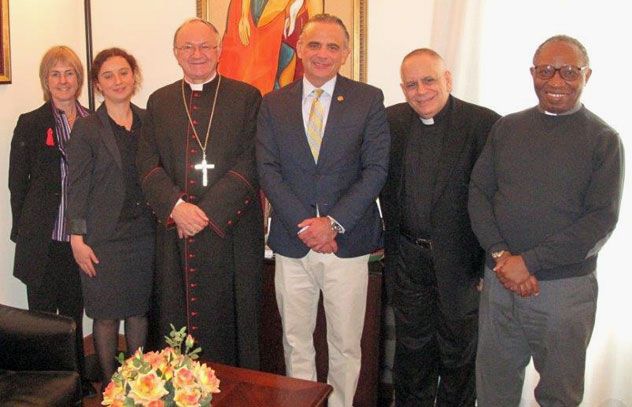
UNAIDS Deputy Executive Director Luiz Loures (centre) met with His Excellency Most Rev. Zygmunt Zimowski, President, Pontifical Council for Health Pastoral Care (centre). Also present, Msgr Robert J. Vitillo Special Adviser for HIV and AIDS, Caritas Internationalis (second from right). Credit: UNAIDS
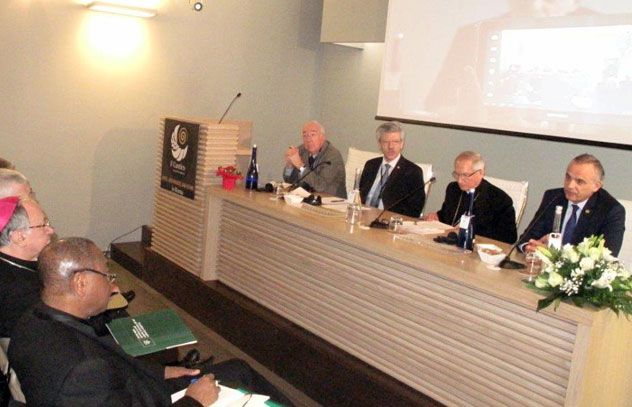
Luiz Loures, UNAIDS Deputy Executive Director opening the meeting. Also present (R to L) H.E. Msgr Rev. Silvano Tomasi, c.s., Apolostolic Nuncio and Permanent Observer of the Holy See to the UN and Specialise agencies in Geneva, His Excellency Kenneth Hackett, Ambassador of the USA to the Holy See, and Mr Michel Roy, Secretary General, Caritas Internationalis. Credit: UNAIDS
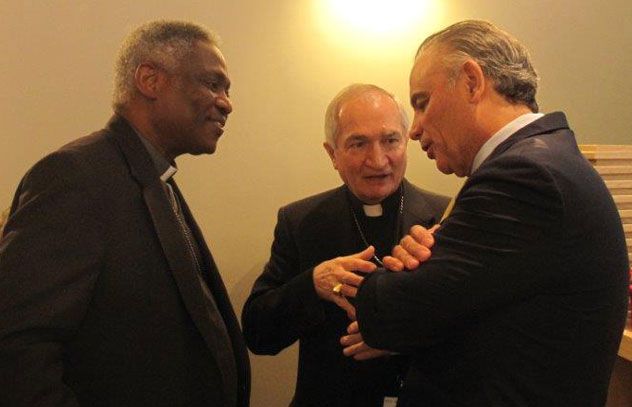
Cardinal Peter Kodwo Appiah Turkson, President, Pontifical Council for Justice and Peace meeting with Luiz Loures, UNAIDS Deputy Executive Director and H.E. Msgr Rev. Silvano Tomasi, c.s. Credit: UNAIDS
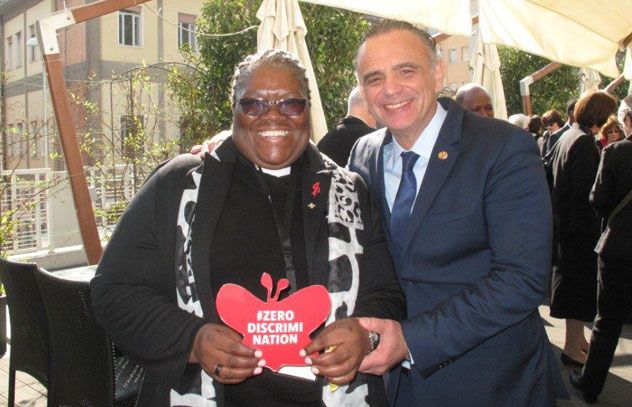
Rev. Phumzile Mabizela, Executive Director, International Network of Religious Leaders living with AIDS (INERALA) supporting the #ZeroDiscrimination Campaign with UNAIDS Deputy Executive Director Luiz Loures. Credit: UNAIDS
Update
Roadmap for faith-based organizations to expand access to HIV treatment
27 February 2014
27 February 2014 27 February 2014Churches and other faith-based organizations are the largest single group providing health care services for HIV—contributing up to 50% of facility-based and community care in some countries.
In order to develop a roadmap to increase faith-based groups’ work in providing life-saving HIV treatment, Caritas Internationalis and UNAIDS co-organized a consultation from 25-26 February in Rome.
Progress made to date; the hope that the end of the AIDS epidemic may be possible by ensuring both the dignity of the person and access to services for all; and the commitment and urgency to act were common themes throughout the meeting.
Specific issues discussed in the meeting included:
- The significant role of the faith community both in delivering services and in ensuring the dignity of the person,
- Collecting and presenting data that demonstrates impact of the work of the faith based community
- The need to increase financial investment in HIV treatment services
- Accelerating work to close the gap in testing and treatment for children
- Including faith-based organizations in national platforms at country level
- Ensuring coordination––not duplication––of services in areas supported by multiple donors
Participants
Participants included representatives from Christian faith traditions, UN organizations, Vatican offices, governments, donors, the medical and scientific community, and the diplomatic corps accredited to the Holy See.
The Consultation was supported by UNAIDS, Caritas Internationalis, UNITAID, the United States Embassy to the Holy See and CUAMM- Doctors for Africa. Cosponsors included the Global Fund to Fight AIDS, tuberculosis and malaria, Catholic Relief Services, and the Ecumenical Advocacy Alliance.
Key outcomes
The main areas identified for further collaboration between international organisations and faith based communities included increased research on results of faith-based HIV treatment programmes, strategic communication about the work of the organizations on the ground, and sharing of good practice models. UNAIDS committed to facilitate dialogues in countries on the role of faith-based organizations in the HIV response.
Quotes
"In all cases, place, at the centre of all our health care interventions, the people [living with HIV], their dignity, their needs and rights."
"We are entering a new phase where we can see the beginning of the end of AIDS. The faith communities have the scale, and the means to move us forward. You care about the dignity of the person and it is only this unique combination of access to drugs and dignity that can provide the necessary drive to reach the end of the AIDS epidemic."
"We can only go so far when you have increased targets and decreased resources."
"Churches are still struggling to understand the epidemic and its role advocating for holistic care of those living with HIV.” Rev. Mabizela identified Issues like inequality between women and men, poverty and apathy as “our worst enemies."
Related
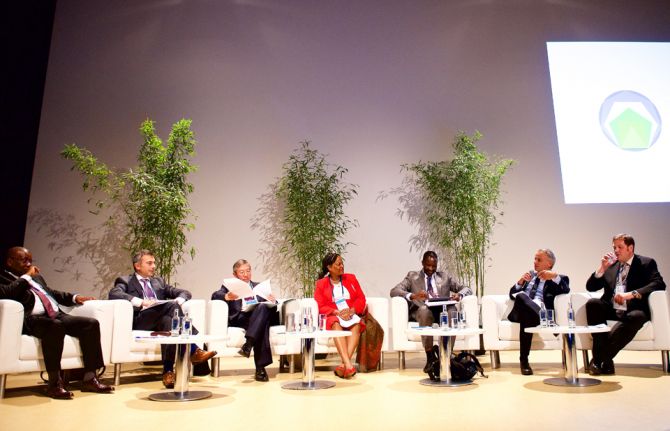 Germany strengthens its position as a global health leader
Germany strengthens its position as a global health leader
25 October 2017
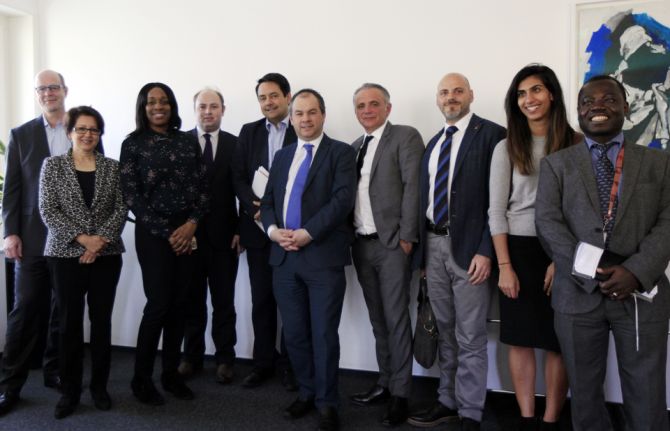 British parliamentarians visit UNAIDS
British parliamentarians visit UNAIDS

31 March 2017

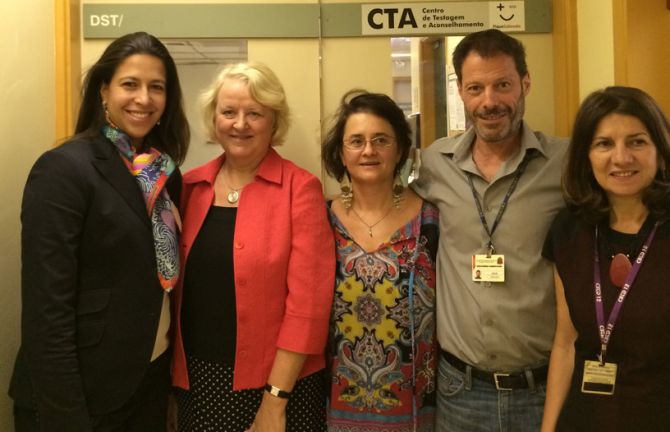
UNAIDS Deputy Executive Director Jan Beagle (second from left) visited a leading institution providing specialized health services for transvestites and transsexuals.
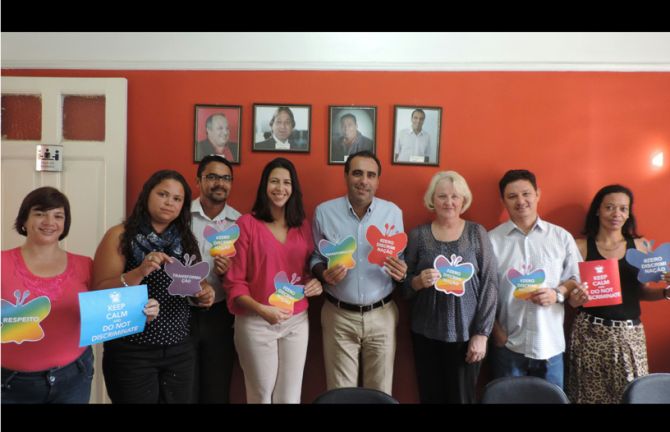
UNAIDS Deputy Executive Director Jan Beagle had the opportunity to talk to civil society representatives at the Forum of NGOs of São Paulo. In the picture, showing support for the UNAIDS' #Zerodiscrimination campaign.
Update
UNAIDS Deputy Executive Director visits specialized health facility for transvestites and transsexuals
26 February 2014
26 February 2014 26 February 2014Brazil is among the leaders in ensuring HIV services reach all people. Created in June of 2009 the Ambulatory Service of Integral Health for Transvestites and Transsexuals is a unique centre in the country.
The centre offers comprehensive care including cardiology, endocrinology, urology and gynaecology, as well as HIV testing and treatment. The facility also provides mental health support, legal counselling and orientation services for income generation.
UNAIDS Deputy Executive Director, Jan Beagle visited the clinic and also spent time with civil society at the Forum of NGOs of São Paulo.
The Forum provides a space for NGOs working on AIDS related issues to share experiences and define common strategies to keep AIDS in the political agenda at national, state and municipal levels.
Quotes
"The service was created because we already had a culture and expertise to work with vulnerable populations. We also discuss with staff in other services to raise their awareness of the special needs. We also have roundtables to sensitize the staff."
"This clinic and the Forum are examples of how we can reach out to people who might otherwise be left behind. I am especially pleased to be able to highlight these success stories in the lead up to Zero Discrimination Day on 1 March."


Front row: Pamela Nash (Chair APPG on HIV and AIDS); Baroness Masham MP; UNAIDS Executive Director Michel Sidibé; UNAIDS Chief of Cabinet Tim Martineau. Back row: Susie Pelly (Coordinator of the APPG on HIV and AIDS); Lord Fowler; Mark Durkan; Russell Brown MP; Mariangela Bavicchi, UNAIDS.
Update
UNAIDS Executive Director meets with UK Parliamentarians
17 February 2014
17 February 2014 17 February 2014UNAIDS Executive Director Michel Sidibé met in London with Parliamentarians from the all-party parliamentary groups on HIV and AIDS and Tuberculosis from the United Kingdom to take stock of the current state of the global AIDS epidemic. The meeting took place on the eve of the UNAIDS and the Lancet Commission meeting which took place in the UK’s capital from 13-14 February where participants are discussing the future of AIDS, global health and development in the post-2015 era.
Mr Sidibé emphasized that despite the great progress made in the response to AIDS the epidemic is not over and that continued support was needed to achieve results. Special mention was given to the need to eliminate the existing levels of stigma and discrimination faced by people living with HIV. Mr Sidibé invited participants to join UNAIDS in commemorating the first-ever International Day of Zero Discrimination on 1st March 2014.

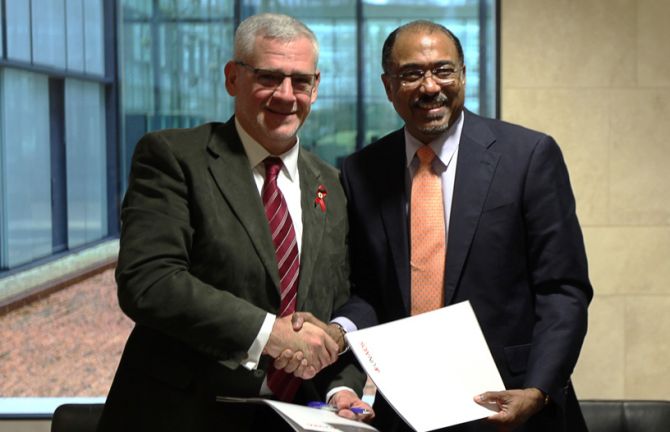
The British Columbia Centre for Excellence and UNAIDS signed a Memorandum of Understanding on 5 February 2014.
Update
New partnership to accelerate HIV treatment scale up
07 February 2014
07 February 2014 07 February 2014UNAIDS and the British Columbia Centre for Excellence in HIV/AIDS formalized their partnership to support efforts to bring HIV treatment to all eligible people.
At the UNAIDS Headquarters in Geneva, UNAIDS Executive Director Michel Sidibé and the head of the BC Centre Dr Julio Montaner, signed on 5 February a Memorandum of Understanding.
In 2013, UNAIDS launched the Treatment 2015 framework, which calls for intensified action and innovation to expedite treatment scale-up. To further the partnership the BC Centre has made a grant of CAD 270 000 to UNAIDS to support scientific modelling and advocacy activities to highlight the need for immediate investments in life-saving HIV treatment programmes.
Quotes
"My home province of British Columbia in Canada has laid the groundwork to end its epidemic through rapid scale-up of HIV testing and treatment. We are now seeing similar results in other settings. We need to take these same approaches and apply them worldwide to end the global epidemic."
"Julio Montaner and his colleagues at the BC Centre for Excellence are globally recognized for their work on HIV treatment and we are happy to continue this long partnership."
Related
 U=U can help end HIV stigma and discrimination. Here’s how
U=U can help end HIV stigma and discrimination. Here’s how

27 February 2025

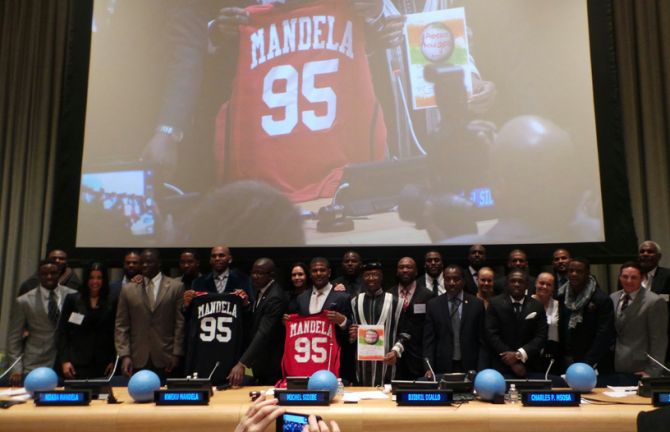
Global sports stars from the NFL, the NBA, the Olympics, diplomats and international officials met at the United Nations headquarters in New York to highlight the power of sport as a force to empower youth, and advance global health and development.
Update
Global stars unite at UN for Sports for Development Summit
05 February 2014
05 February 2014 05 February 2014Global sports stars joined diplomats and international officials at the United Nations in New York to highlight how sport can empower youth and advance global health and development.
The Jack Brewer Foundation, in partnership with UNAIDS, brought together athletes from the National Basketball Association (NBA), the Olympics and more than 20 players from the National Football League (NFL) who joined the summit on the eve of the LXVIII Super Bowl final.
Led by Jack Brewer, founder of the Jack Brewer Foundation and Sidney Rice, a wide receiver with the Seattle Seahawks, NFL stars and agents described how they are ‘giving back to their communities’ by using the power of football to engage young people—in the United States and in developing countries such as Haiti and Malawi—on health promotion and development.
The spokespersons for the UNAIDS Protect the goal campaign, Ndaba and Kweku Mandela, called for engaging youth around the world to reach an AIDS-free generation and continue the legacy of their grandfather, Nelson Mandela, in the AIDS response. The Protect the goal campaign aims to raise awareness of HIV and mobilize young people to commit to HIV prevention in conjunction with the 2014 FIFA World Cup in Brazil.
Quotes
"Sports have opened so many doors. I've been to Asia, South America, and many different countries that I have never dreamed of growing up. We want to find the best way possible to protect the children who are growing up playing at the early ages."
"Sports stars are more than role models. You are transforming the lives of underprivileged youth around our great nation and the world."
"My grandfather Nelson Mandela believed that sport has the power to inspire and speak in a language that youth understand. This is a great opportunity to be involved in UNAIDS Protect the goal campaign."
"Sports are a great equalizer of humanity—uniting rich and poor, young and old. And sports stars have the unique ability to inspire people who might not otherwise be reached."
Related

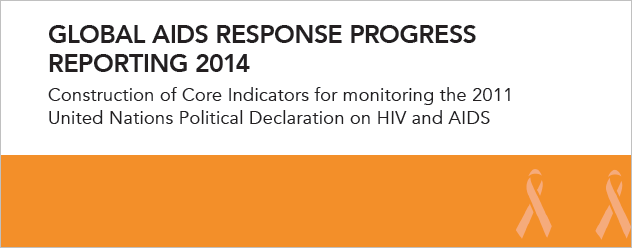
Global AIDS response progress reporting 2014
Update
Guidelines for 2014 Global AIDS response progress reporting released
24 January 2014
24 January 2014 24 January 2014The 2014 Global AIDS response progress reporting (GARPR) guidelines were released on 24 January. The guidelines provide countries with technical guidance on how to measure progress towards the ten targets set in the 2011 United Nations Political Declaration on HIV and AIDS. They include the detailed specifications of the core indicators, the data required, and how data will be interpreted.
The guidelines invited countries to submit their monitoring data, HIV estimates and a narrative report for the year 2013 by 31 March 2014. The results will be used to inform several reports published by UNAIDS in 2014, including a report on the global AIDS epidemic.
The guidelines encourage countries to use the data gathering as an opportunity to consult with key constituents, including civil society, on how to improve the national AIDS response. This round of reporting also provides the occasion to reprogramme efforts with development partners, including with the Global Fund to Fight AIDS, Tuberculosis and Malaria in preparation for its new funding model.
Related

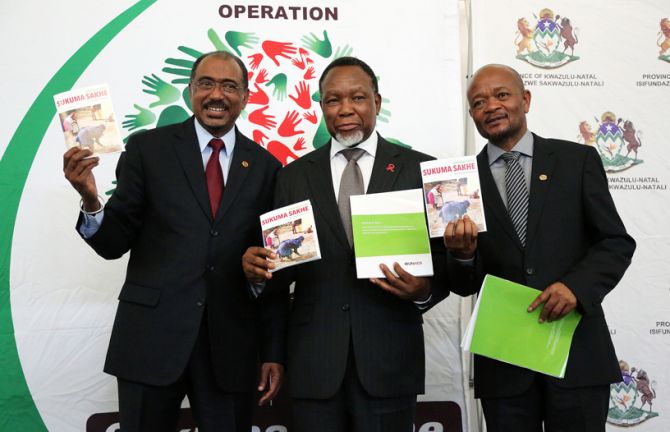
Michel Sidibé, UNAIDS Executive Director, Kgalema Motlanthe, Deputy President of South Africa and the Premier of KwaZulu-Natal, Senzo Mchunu at launch in Durban. Credit: UNAIDS/Anesh Debiky
Update
New HIV report finds big drop in new HIV infections in South Africa
17 January 2014
17 January 2014 17 January 2014New data show that new HIV infections have been reduced by about a third from 2004 and 2012. The South Africa 2012 HIV Estimates and Projections at-a-glance report was launched in Durban, South Africa on 10 January by the Deputy President of South Africa, Kgalema Motlanthe and UNAIDS Executive Director, Michel Sidibé. Additionally, the Premier of KwaZulu-Natal, Senzo Mchunu launched the Operation Sukuma Sakhe Best Practices Publication at the same event.
There are 6.1 million people living with HIV in South Africa. Since 2009, the government has massively scaled up HIV prevention and treatment programmes. According to the National Department of Health, in 2012, some 2.2 million people were accessing HIV treatment, making it the largest HIV treatment programme in the world. The data show that the number of new HIV infections has dropped from 540 000 new infections in 2004 to 370 000 in 2012.
The Premier of KwaZulu-Natal also highlighted the achievements of Operation Sukuma Sakhe. ‘Let us stand and build’ is a community-led empowerment programme to address poverty, HIV, gender inequality and other family and community priorities.
The programme follows an integrated multi-sectorial service delivery model, which puts individuals, households and communities at its centre to tackle poverty, food insecurity, health and environmental issues.
According to the publication, KwaZulu-Natal is one of the most affected regions—with about a third of the people living with HIV in South Africa, living in the province.
Quotes
“Although these are figures we can all be proud of, we must not rest until every person who needs it is receiving HIV treatment and there are no new infections.”
“Operation Sukuma Sakhe has allowed us to provide services closer to our people and to address the myriad of social issues they face in one place, instead of at multiple service providers.”
“I am confident that through the successful implementation of Operation Sukuma Sakhe, KwaZulu-Natal Province will realize our common vision of zero new HIV infections, zero discrimination and zero AIDS-related deaths. You are changing the course of the epidemic, not only in your country, but also on the continent and the world, by your efforts and achievements in the HIV response.”







